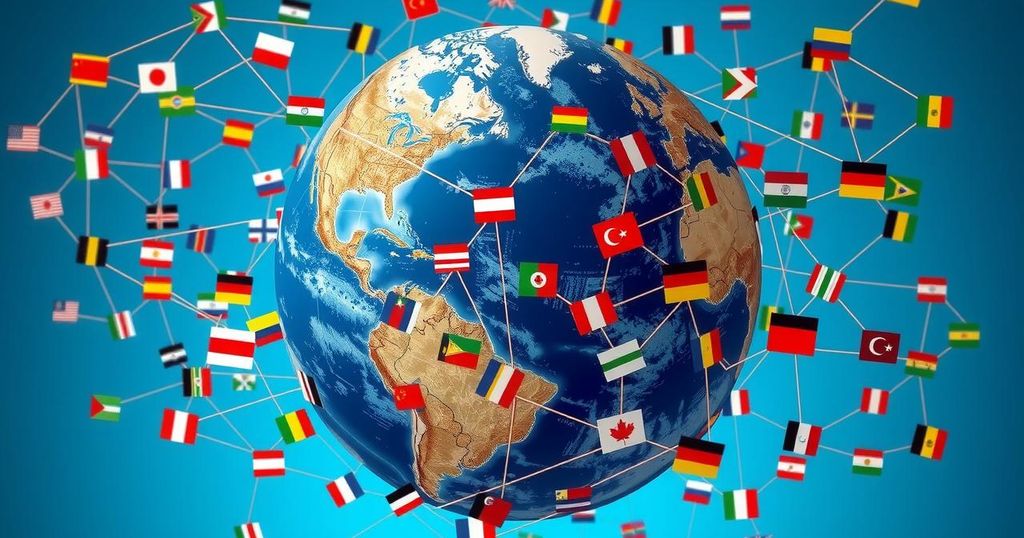Trump’s Foreign Policy: Ambitious Promises, Limited Accomplishments
As President Donald Trump’s second term approaches its first 100 days, his foreign policy and trade initiatives have achieved minimal results. Russia continues its aggression in Ukraine, Israel’s actions in Gaza persist, and the trade war with China shows no signs of resolution. Trump’s oversimplified and transactional approaches have alienated allies, complicated conflicts, and disrupted economic stability, questioning his effectiveness as a global leader.
As President Donald Trump nears the symbolic landmark of his first 100 days in his second term, his foreign policy initiatives have yielded limited progress in resolving global conflicts and reforming international trade to favor the United States. Despite his promise to end the war in Ukraine swiftly, Russia continues its military operations, while Israel’s aggressive actions against Palestinians persist. Concurrently, the trade war with China remains stagnant, with no apparent willingness for compromise from the Chinese government. These situations cast doubt on the effectiveness of Trump’s strategies, illustrating a pattern of overconfidence and simplistic solutions to intricate global issues.
Trump envisioned a quick resolution to the Ukraine conflict leveraging his rapport with Russian President Vladimir Putin. His proposed plan included a rapid ceasefire, territorial concessions to Russia, and a strategic reduction in aid to Ukraine to compel compliance. However, Putin dismissed the ceasefire offer, revealing that Trump’s assessment did not consider the complexities of the situation. Ukrainians continue to firmly reject any territorial cessions, especially concerning Crimea, indicating a miscalculation in Trump’s approach to the multifaceted conflict.
Furthermore, Trump’s strategy of personal negotiation in lieu of understanding geopolitical intricacies has alienated NATO allies and supporters of Ukraine who perceive his diplomatic concessions as rewards for Russian hostilities. His decision to exclude Ukraine from US-Russia discussions exacerbated these concerns, leading to widespread criticism. The plan to enable Russia’s retention of occupied areas undercuts international unity against aggression and poses a risk of future conflicts arising from a perceived weakness in U.S. diplomacy.
In addressing the Gaza issue, Trump sought to capitalize on the Abraham Accords that established normalized relations between Israel and certain Arab nations. While these agreements were significant, they neglect Palestinian aspirations for statehood. Trump’s actions, including moving the U.S. Embassy to Jerusalem and cutting aid to Palestinian refugees, have intensified divisions rather than foster peace. His controversial remarks urging Israel to “finish the job” in Gaza further empowered far-right elements, exacerbating the humanitarian crisis that has claimed thousands of Palestinian lives.
Recently, Trump suggested the relocation of Gazans to Egypt and Jordan while proposing to transform Gaza into a tourist destination. Although he later framed this as merely a recommendation, the proposal illustrated his transactional approach, lacking sensitivity to the intricacies of the conflict. Such rhetoric not only inflamed tensions in the region but also compromised the United States’ longstanding role as a neutral mediator in international disputes.
Central to Trump’s “America First” agenda is a tariff policy aimed at reducing the trade deficit while protecting domestic industries. Critics contend that these policies have fractured global supply chains without delivering significant economic advantages. The ongoing trade conflicts with China involve high tariffs and retaliatory measures, negatively impacting both economies and the global market.
American consumers are beginning to experience the impact of these tariffs through rising prices and declining stock values, leading to growing dissatisfaction domestically. In response to this backlash, Trump has rescinded tariffs on essential electronics; however, these adjustments may not be sufficient to counter the broader economic repercussions stemming from his trade policies. Meanwhile, China is well-prepared to withstand the trade war, having reduced its dependence on U.S. exports while expanding trade with other nations.
Moreover, China’s Belt and Road Initiative has enabled it to diversify trade routes, creating a buffer against economic challenges posed by the trade dispute. In contrast, the U.S. faces significant internal struggles, including disrupted supply chains and increased production costs due to the lack of a cohesive response to these emerging issues. This raises significant concerns about the sustainability of Trump’s trade policies and their long-term implications on global economic structures.
In conclusion, President Trump’s second-term foreign policy and trade strategies are characterized by bold assertions that have often resulted in limited outcomes. His transactional diplomacy, marked by hastily made decisions and an oversimplified understanding of complex issues, has strained alliances, intensified conflicts, and destabilized economic conditions. From ongoing conflicts in Ukraine and Gaza to the unresolved trade issues with China, Trump’s focus on immediate gains raises doubts regarding the efficacy and coherence of his administration’s approach to international relations.
In summary, President Trump’s foreign policy and trade strategies reflect a tendency towards aggressive promises yielding minimal results. His reliance on personal negotiation and simplistic solutions has not only alienated international allies but also exacerbated ongoing conflicts and economic instability. The implications of his decisions, ranging from the wars in Ukraine and Gaza to the contentious trade war with China, highlight the challenges of his administration’s approach to global engagement.
Original Source: risingnepaldaily.com




Post Comment